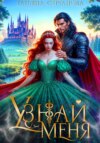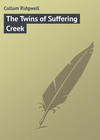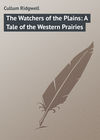Kitobni o'qish: «The Men Who Wrought»
CHAPTER I
THE DANGER
"Amongst the many uncertainties which this deplorable, patched-up peace has brought us, there is, at least, one significant certainty, my boy. It's the inventor. He's buzzing about our heads like a fly in summer-time, and he's just about as – sticky."
Sir Andrew Farlow sighed. His sigh was an expression of relief; relief at the thought that he and his son, dining together at Dorby Towers for the first time since the dissolution of Parliament had released the latter from his political duties, had at last reached the end of a long discussion of the position brought about by the hopelessly patched-up peace, which, for the moment, had suspended the three years of terrible hostilities which had hurled the whole of Europe headlong over the precipice of ruin.
The great ship-owner toyed with the delicate stem of his liquor glass. There was a smile in his keen blue eyes. But it was a smile without lightness of heart to support it.
"Yes, I know. They've been busy enough throughout the war – and to some purpose. Now we have a breathing space they'll spread like a – plague."
Ruxton Farlow sipped his coffee. The weight of the recent discussion was still oppressing him. His mind was full of the appalling threat which the whole world knew to be overshadowing the future.
The dinner was drawing to its close. The butler, grown old in Sir Andrew's service, had finally withdrawn. The great Jacobean dining-hall of Dorby Towers, with its aged oak beams and beautifully carved panelling, was lost in the dim shadows cast by the carefully shaded table lights. Father and son were occupying only the extreme end of the dining-table, which had, at some far-distant age, served to bear the burden of the daily meals of half a hundred monks. There were no other lights in the room, and even the figures of the two diners were only illuminated by the reflected glow from the spotless damask on the table, a fashion to which the conservative habits of the household still ardently clung. It was a fitting setting for such a meeting as the present.
Sir Andrew Farlow, Baronet, was one of the greatest magnates of shipping and ship-building in the country, and was also one of the greatest sufferers by the German submarine warfare during the late war. His extreme wealth, and the fact of the enormous Government contracts in his ship-building yards, had left him practically immune from the consequences of his losses, but the losses to his fleet had been felt by the man, who was, before all things in the world, a shipmaster.
His son, and only partner, had spent those past three years in the service of his country. Not in the actual fighting line but in the work of organization, an important position which his wealth and capacity had entitled him to.
Sir Andrew pierced and lit a cigar.
"We mustn't ridicule them, though," he said, in his hearty Yorkshire way. "We've laughed at 'em too often in the past. It's a laugh which cost our country a couple of thousand millions, and a world-wide suffering which mankind will never forget." Then his manner lightened. "Henceforth the inventor must be to us a rare and precious orchid. We must spend hundreds of thousands of pounds on him, the same as I spend thousands on my orchid houses. I count myself well repaid if I succeed in raising one single perfect bloom on some rare plant. That is, if my rivals have failed with the same plant. The inventor is the orchid of modern civilization, and the perfect blooms he produces are very, very precious and – rare."
"You are thinking of those diabolical engines of destruction which were prepared for this war."
Ruxton helped himself to a cigar.
"On the contrary, I am thinking of the defence, not the offence, of this old country of ours."
The younger man nodded as he lit his cigar.
"That is it. We must prepare – prepare. We have only a breathing space for it."
"There must be no more slumbering."
"And no more sacrificing the country to self-seeking demagogues."
"Yes, and no more slavery to Party prejudices, as antique as the timbers of this house."
"Nor the knaveries of men who seek power through dividing the country into classes, and setting each at the other's throat."
"Nor must we ever again allow the nation's security, economic or military, to be hurled into the cockpit of Party politics."
"Gad! It makes me shiver when I think how near – how near – "
"We were to destruction," added Sir Andrew gravely.
It was again a moment of intense thought. Each man was regarding from his own view-point that intangible threat inspired by the unsatisfactory termination of the war, which left the Teutonic races in a position to brew further mischief with which to flood the world.
The pucker of thought, the drawn brows, completed the likeness of Sir Andrew Farlow to England's national symbolic figure. His broad shoulders and shortish figure; his round, strong, Yorkshire face, with its crowning of snow-white, curly hair, and the old-fashioned, crisp side whiskers made him a typical John Bull, even in his modern evening dress.
In the case of his son Ruxton it was almost in every respect an antithesis.
No foreigner would have taken Ruxton Farlow for anything but an Englishman, just as no Englishman but would have charged him with possessing foreign blood in his veins. And the Englishman would have been right.
Sir Andrew Farlow had spent a brief married life of a few months over one year with one of the most beautiful women amongst the Russian nobility, and the birth of his son left him a widower.
From his mother young Ruxton had inherited all those characteristics which foreign Europe assigns to the British born; his great size, his fair, waving hair and his darkly serious eyes. These things all came from his Russian mother, who had possessed them herself in a marked degree. Furthermore he inherited other qualities which could never be claimed for his Yorkshire father. The boy from his earliest childhood was an idealist: an idealist of but a single purpose which developed into a brilliant specimen of the modern product of an old-fashioned patriotism.
But he brought more to bear upon his patriotism than the mere passionate devotion to his country. He was a fine product of public school and university with the backing of a keen, well-balanced brain, and a natural aptitude for statecraft in relation to the rest of the world. He saw with eyes wide open to those interests dearest to his heart, and clearly, without one single smudge of the fog of personal self-interest.
"It's never out of my thoughts, Dad," Ruxton said at last. "It is with me at all times. It is the purpose of my life to devote myself to, and associate myself with, only those who will place their country before all else in life."
"An ideal difficult to realize in Great Britain," observed his father drily.
"Do you think that? Do you really think that?"
Sir Andrew stirred impatiently.
"It is not what I think. It is not what any of us think. It is what we see and hear – and know. This war has shown up so many weaknesses in the armor of our social economy as well as the psychology of our people that one hardly knows where to hurl one's condemnation the most forcefully. So many weaknesses and failures stand out crying aloud for the bitter castigations of national conscience that it is difficult to point out one worthy feature. Oh, you think that too sweeping," cried the baronet with flushed rugged cheeks and brow, as his son raised questioning eyes in his direction. "That is what every other man and woman in the country would say in their purblind vanity. But it is true. True of the country. True of us all. There is one thing which appeals to me as our greatest failure, however. One failure preëminent over all others that has sunk deep down in my heart, and the scar of which can never be obliterated. I was brought up in the early Victorian days when patriotism was no mere head-line in a sensation-loving press. It was something real. Something big. Something which gripped the sense of duty and made our men and women yearn for active participation when danger threatened our Empire, even to the sacrifice of all they held dear in life. That national spirit was sick to death when this war broke out. Our press was divided, our politicians were divided, and, yes, our people were largely indifferent. But for the strength of a few of our leaders, men who have deserved far better of our country than our country has ever yielded them, thanks to indifference and Party politics, the end of this war would have come with even more terrible consequences to our Empire than all that is signified by the position, almost approaching in status quo ante, in which we now find ourselves. The ramifications of our lack of national spirit are so multifarious that it is impossible to go into them as a whole. One or two, however, are so prodigious, and have been so pronouncedly marked, that the veriest optimist has not failed to observe. One which stood out remarkably was the attitude of the reigning Government when war was declared. Every newspaper cried aloud that our ranks had closed up to meet the peril. They did close up, as far as the will of the country was concerned, but our machinery was geared to certain movement, a machine built through years of partizanship in politics. The result was pitiful. When the party in power was faced with Labor troubles which threatened our downfall in the war, they dared not face their task of drastic remedy because they saw in the dim future the loss of votes which would return their opponents to power at the next election. Hence the political crisis, at a time when we could ill afford such crises, and the formation of a coalition. Ten months were thus lost in drifting while Labor played, and our soldiers, inadequately armed, went to their deaths. The press, a divided press, mark you, sought a scapegoat in the individual, when they, no less than our national machinery, were to blame for the disaster. Is such a condition conceivable in a fervent Latin race, or an iron-shod Teuton? No, no. Is it right to blame Labor, who, for the past decade and more, has been coddled and pampered into the belief that like any baby in its cradle it has only to cry loud enough to obtain the alleviating fluid? It at least has cunning enough to realize that its weight of vote in the country is sufficient to control the destiny of the demagogues who seek place and power through its ignorance. Man, but it makes me sweat to think of it. National spirit? Faugh! Look at the manufacturers. Patriotism? They were full of newspaper patriotism until those who were executing Government contracts discovered that their profits were to be limited. The Army? Our voluntary system? The Army was all right. Oh, yes, the Army was great. But the system? The system was probably the most painful among all our national systems. The most hopelessly inadequate. And, from a national spirit view, was hideously grotesque. But the men who joined and shed their blood upon those terrible battle-fields abroad were as the worker in the vineyard who engaged for one penny. They gave their all, and made up in the execution of their duty for those who sheltered behind the skirts of their womenkind, and the race of shopkeepers they left behind. The spirit of our country when the war broke out was a sordid commercial spirit. 'Business as usual' was the cry. Then our press, our wonderful divided press, said the country was not awake. It was slumbering! I tell you it was a lie!" The old man banged his fist upon the table and set the glasses jumping. "Our country was not asleep. Every man, woman, and child capable of common understanding realized our peril from the start. It was the hateful commercial mind seeking to make gain out of the disaster which had overtaken the world, that mind that has acquired for us the detestable sobriquet of 'a race of shopkeepers,' that hindered and deterred us. We were not slumbering. We were awake. Wide awake! To think that I have lived to see the day when our women's fair hands should be called upon to distribute the white feather. Our present-day musicians and our national bards will tell you that the old songs of England are out of date. They are right. Our girls and boys look askance at your Marryats, your Dickenses, your Thackerays, your Stevensons, and all those great masters who found their strength in our country's greatest ages. When war broke out we were floundering in the mire of sensualism brought about by the years of peace and security, and so we bred the cult of the sensualist writers on sex problems, and all the accompaniment of the other arts to match."
The white-haired veteran, who had spent his early youth fighting his country's battles on the Empire's frontiers, and, in later days, had devoted all his energies to the furthering of Britain's supremacy on the seas, passed one strong hand over his lined brow. He swallowed like a man choking back an emotion threatening to overwhelm him. Then the flush died out of his rugged cheeks, and he smiled at the son he loved, and who was his one remaining relative. "Forgive me, my boy, but – but all I've said is true. I don't think many will deny it. Anyway those who do are lying to their own consciences, or – or are purblind in their insane egoism."
Ruxton smiled responsively and thrust back his chair.
"There's no forgiveness needed, Dad," he said. "You have quoted but a few of the hundred signs, of which we all have proof, that when war broke out patriotism had only the smallest possible part in the life of this country. From the beginning to the end of this war England has had to pay out of her coffers, to those of her people whose services she needed, a price so extortionate that one wonders if it is not all some hideous nightmare and in truth unreal. But tell me, Dad," he went on after a pause, "you spoke just now of inventors, and your manner suggested that there was something – important."
Sir Andrew rose from the table and led the way towards the distant folding doors.
"Well, I don't know if it will prove to be anything – worth while."
He fumbled at an inner pocket of his dinner coat, and produced a letter written on thin paper. When they reached the great hall and stood under the brilliant electrolier he unfolded it and held it out for his son's perusal.
"I get lots of them," he said almost apologetically, "and few enough turn out worth while. This one reads a little different. That's all."
"Sir,
"You are a great shipmaster. You owned a fleet of merchant shipping when war broke out of forty-two coastwise and thirty-five ocean-going ships. At the end of the war you owned thirteen coastwise and twenty-one ocean-going traders. I have a means of saving you any such loss by submarine in the future. May I be permitted to show you my invention?
"Truly yours,
"Charles Smith.
"P.S. – Absolute secrecy is necessary. A simple 'yes' addressed by wire to Veevee, London, will be sufficient."
"The wording of it is so unusual that it – interested me," Sir Andrew went on, as Ruxton began to read the letter a second time.
Presently the younger man looked up from his reading.
"That's your imagination working, Dad," he said, smiling. Then he added: "Let it work. Let it run riot. That's what we want in England – now. I should see this man. I think he is a foreigner – in spite of his English name."
The John Bull face of the elder man wreathed into a warm smile as he looked up at his towering son.
"I had decided to," he said quietly.
Ruxton handed him back the letter. Then he moved across to the great mullioned window and looked out upon the perfect summer night. The moon was shining at its full and not a cloud was visible anywhere.
"I have some letters to write, my boy," Sir Andrew went on. "If you want me I shall be in the library. What are you going to do?"
"I think I shall take a stroll along the cliffs. It'll do me good, Dad. I want to feel our beloved Yorkshire cliffs under my feet again, and make sure they're – still there."
Ruxton laughed.
"The General Election is on August 21st, isn't it?" his father enquired presently. "You've got seven weeks in which to recuperate, and get the cobwebs blown off you."
"I always get rid of bad fancies up here in my native air," Ruxton said lightly. "I'm glad we haven't a strenuous campaign."
"No. We shall win all right."
"Win?" Ruxton laughed. "The National Party will sweep the polls. Labor will be opposed to us as Labor will oppose any party. They will always be with us. But even if the extreme Radicals were to link forces with them, they couldn't obtain a twenty-five per cent. representation. No, Dad, whatever the country failed to realize during the first two years of war, it's been all brought home to it now. The English housewife has been driven to a sweeping and garnishing of her home. We've driven her to that, and the National Party is —going to see she does it thoroughly."
The younger man's enthusiasm drew an approving smile from his father. Also a world of pride in this great, fair-haired idealist shone in his eyes.
"Sweep and garnish. That's it, boy," he said ardently. "And what a sweeping, what a garnishing is needed. I wonder. Can it be done?"
"That is what we intend to test. It is to that great effort my colleagues have pledged their lives. I have pledged mine to another. I tell you, Dad, that the sweeping and garnishing isn't sufficient. That is only the moral side of the campaign that lies before us, and without it the other side can never be achieved. But all my future is to be given up to the material security side of the problem. It may be only my dreaming, but I seem to see a terrible threat sweeping up over the eastern horizon. A threat so appalling for us as to make the late war almost insignificant. Some day, if you have the patience to listen to a dreamer, I will tell you of the dread that persistently haunts me. Meanwhile we have that – breathing space."
Without troubling himself to get a hat Ruxton Farlow passed through the entrance hall, out into the brilliant, warm summer night, and strode on towards his destiny.
CHAPTER II
A STRANGE MEETING
The peace of the night knocked vainly at the heart of the man as he moved along over the grass-grown cart track, which skirted those fields abutting on the pathway marking the broken line of the lofty Yorkshire cliffs.
The warmth of the July air left him utterly forgetful of the light evening clothes in which he was clad, just as the grass-grown track failed to remind him that the shoes he wore had never been intended for country rambles. The soft sea breeze fanned his cheeks, and the bracing air added vigor of body if it left his mental feelings wholly uninspired.
For the time, at least, Ruxton Farlow was living within himself. His mental digestion was devouring hungrily of that force which had come to make his contemporaries realize that here was a man of that unusual calibre which must ultimately make him a leader of men in whatever walk of life he chose for that strenuous journey.
The full moon, shedding a ghostly glory on every hand, yielded him the necessary guidance for his footsteps. It served his purpose, but its beauty for once left him unimpressed. The diamond-studded sky suggested no jewel-bedecked cloak of mysterious night as at other times it was wont to appeal. All romance was dead for the time, as though the shutter of his mental camera had been closed with a slam for the development of the plates within which held those living, grim pictures of the life he felt himself surrounded by on every hand.
He passed the last stile and faced the open sea. That smooth limitless expanse, sighing and restless, as it gently rocked its bosom like some aged crone nursing the infant she was too old to bear herself. He flung himself full length upon a rustling bed of heather. His head was towards the sea, and craning over the very edge of the dizzy cliff. There was no thought in his mind of the dangerous proximity. He had known these cliffs almost from his birth up. They were the friends of his whole life, and their possible latent treachery was unthinkable to him. He propped his face between his two hands and sank his elbows deep into the heather. Then, like some schoolboy, his feet were raised behind him, and crossed, while his eyes searched that mysterious horizon lost in the shadows of a perfect night.
It has been said that Ruxton Farlow was an idealist. But let there be no misapprehension about it. His idealism was practical and full of sanity. He was no visionary. His mind was ever groping for the material welfare of his country. The moral welfare, he felt, should be in hands far more capable in that direction than his life and learning had made his. It had been his habit of life to feed his mind upon hard and incontrovertible facts which bore upon the goal of his ideals. He accepted nothing which was merely backed by academic logic. He demanded the logic of practice. Theory was impossible to him, unless that theory was demonstrated in practice. Thus it was he kept his mind alert for facts – and again facts.
The facts which concerned him at the moment were many, and he found in them all, when arranged in due order, one stream like some rushing river which raced on its tempestuous way to the wide sea of disaster beyond.
The starting-point of his facts was the truth that no modern combination of force, however superlative its effort, could crush out of international existence the power of two peoples with aggregate populations of virile strength of some hundred and odd million souls. The war had proved that. And the only possible peace resulting from it had added the conviction that, from a peace point of view, the war had proved utterly useless and damaging. Besides the enormous expenditure of treasure and the vast sacrifices of human life, it had given the world a nominal peace backed by an aggravation of international hatred and spleen a thousand times greater than had ever been known in history since the days of bare-limbed savagery.
What then was the outlook? The man stirred with that nervous suggestion of a disturbed mind. War – war! On every hand war – again. Once again all the moral development of the human race towards those higher planes of light, learning, and religious ideals was shadowed by the spectre which during the last three years had flung men back to the shadows of an ancient savagery and barbarism.
The savage mind of the Teuton had broken out into a fierce conflagration of barbarism. Again it would smoulder, like some slumbering volcano, only to break out again when the arrogance of the German heart told it that the time was ripe to avenge the indignity of its earlier failure.
Ruxton Farlow accepted this as his basis of fact, and followed the river down its turbulent course towards that sea of disaster which he already saw looming ahead. It required no imagination. The course was a straight one, straight as the crow flies. For that passion of hatred which inspired the flood brooked no obstruction to its course. It clamored for its goal and swept all side issues out of its path. Great Britain lay in that sea beyond. Great Britain, who, in German eyes, owned the earth, and incidentally had snatched even those inadequate colonies from her bosom, which, through long years of diplomatic trickery, she had contrived to acquire. The Prussian passion for conquest had been changed through the late war to the passionate national hatred of the German people against Great Britain. This was clear. So clear that the light which shone upon it was painful to his mental vision.
What then was the resulting position of the country he loved? The lessons of the war were many – so many. Yet preëminently outstanding was one fact which smothered all others in its significance, and reduced them all almost to nothingness. His father had dwelt upon the lack of national spirit when war broke out. That had been remedied. The country had changed during those three years of suffering and sacrifice. No, his father had missed the great lesson. Yet it was so simple – so simple.
The man raised his head higher, and folded his arms under him as a support. He gazed down at the calm summer moonlit sea. So calm, so peaceful, so – seductive to the straining mind.
He began to realize the yearning of the suicide for the peace beyond life. How easy to solve all problems. How easy to rid oneself of the duties, the harassing, cruel duties imposed by the Creator of all life. The soft murmur of the breaking swell upon the beach below. One plunge beneath that shimmering surface and – nothing. In that instant there flashed through his mind a memory of just such another sea. The perfect summer sea. The great ship, one of the wonders of the age. A stealing trail of foam across the glass-like surface. An explosion. Then fifteen hundred souls solve the problem of that – nothing! Ah, that was it. That was the Danger. He knew. Every thinking human being knew that if Germany had begun war with a fleet of some three or four hundred submarines, three weeks would have terminated the war so far as Britain was concerned.
He moved over on to his side, and his movement was a further expression of nervous tension. He propped his head upon one hand with his eyes fixed on the vague horizon beyond which the Teutonic giant was peacefully slumbering, and his thought was spoken aloud.
"Is he slumbering?" he asked of the sea. "Is he? Will he ever sleep again? No, I think not. Not at least while there is a chance that his intelligence behind the machine can render an island home untenable."
"Night claims from the overburdened soul the truth which daylight is denied."
Ruxton Farlow sat up with a jolt. His dark, searching eyes were turned from the sea. They were turned in the direction whence the voice, which had answered him, had proceeded. In the brilliant moonlight he saw the outline of a figure standing upon the footpath which ran parallel to the coast-line. The figure was not quite distinct, but it was clearly a woman's, which corroborated the conviction he had received at the sound of the voice.
"But for once she has betrayed her – trust," he said, and a feeling of irritation swept over him that he had permitted himself to respond to the challenge of this stranger, who was probably something in the nature of one of life's vagrants, wandering homeless over the deserted ways of the countryside.
Then he discovered to his further annoyance that his response had brought forth its logical result. The figure was moving towards him, and as it drew near he became aware of that delightful feminine rustle which no man ever yet found unseductive.
The woman made no verbal reply until she was standing before him. Ruxton was still sitting on the heather, but his eyes were wide with astonished admiration, and his clean-shaven lips were parted, which added to his whole expression of incredulous amazement.
The woman standing before him was no vagrant, unless a vagrant could possess a queenly presence, and an attire which suggested the best efforts of London or Paris. He stared, stared as might some schoolboy budding into manhood at the sight of a perfect womanhood. Then, in a moment, questions raced through his head. Who was she, and where – where did she come from? What freak of fortune had set her wandering those cliffs alone – and at night?
She was beautifully tall and crowned with a royal wealth of hair which remained hatless. Its color was not certain in the moonlight, but Ruxton felt that it must be red-gold. He could think of no other color which could match such a presence. Her figure, sharply outlined in the moonlight, was superb. It suggested all he had ever seen in those ardent dreams of youth. Her face possessed something of the reflected glory of the moon lit by eyes whose color was hidden from him, but which shone like great dull jewels full of a living fire.
All these things he realized in one swift comprehensive glance. But in another moment his whole attention was absorbed by the rich voice, the tones of which were like the softest music of some foreign southern land.
"It is scarcely fair to blame the night," she said, in smiling protest.
All unprepared for the encounter Ruxton had nothing but a stupid monosyllable to offer.
"No," he said, and a sigh somehow escaped him.
Then, in a moment, the blood was set swiftly pulsating through his veins.
"May I sit down?" the woman enquired. "I have had a long walk, and am a little tired," she added in explanation.
But she waited for no permission. And somehow Ruxton felt that her expression of weariness was far below the mark. She appeared quite exhausted.
"You are more than a little tired," he said, with urgent solicitude.
Now that her face was nearer to his level he could see that she was indeed very, very beautiful. Her eyes were large and almost oriental in their shape. Her cheeks were as delicate as the petals of a lily. The contour of her whole face was a perfect oval with just sufficient lengthening to give it character.
She did not deny him. But a smile lit her eyes.
"This is delicious," she said, with a sigh of content, turning her face towards the sea, and drinking in deep draughts of fresh, salt air.
Ruxton endeavored to gather his faculties, which had been completely scattered by the thrilling shock of the encounter. He felt himself to be like a callow youth of seventeen rather than a man of over thirty-five, a man whose public life had made intercourse with women of society a matter of every day.
"You have had a long walk?" he enquired wonderingly. "But at night? On these cliffs? You are ten miles from Dorby, and there is no habitation between – except Dorby Towers. Beyond this there is a village or two, but no railway for miles." He had made up his mind that she did not belong to this district. Her costume was still in his thoughts.
"I did not come from Dorby. Nor from any of those villages. Still, I have had a long walk. I have been on my feet nearly three hours."



















